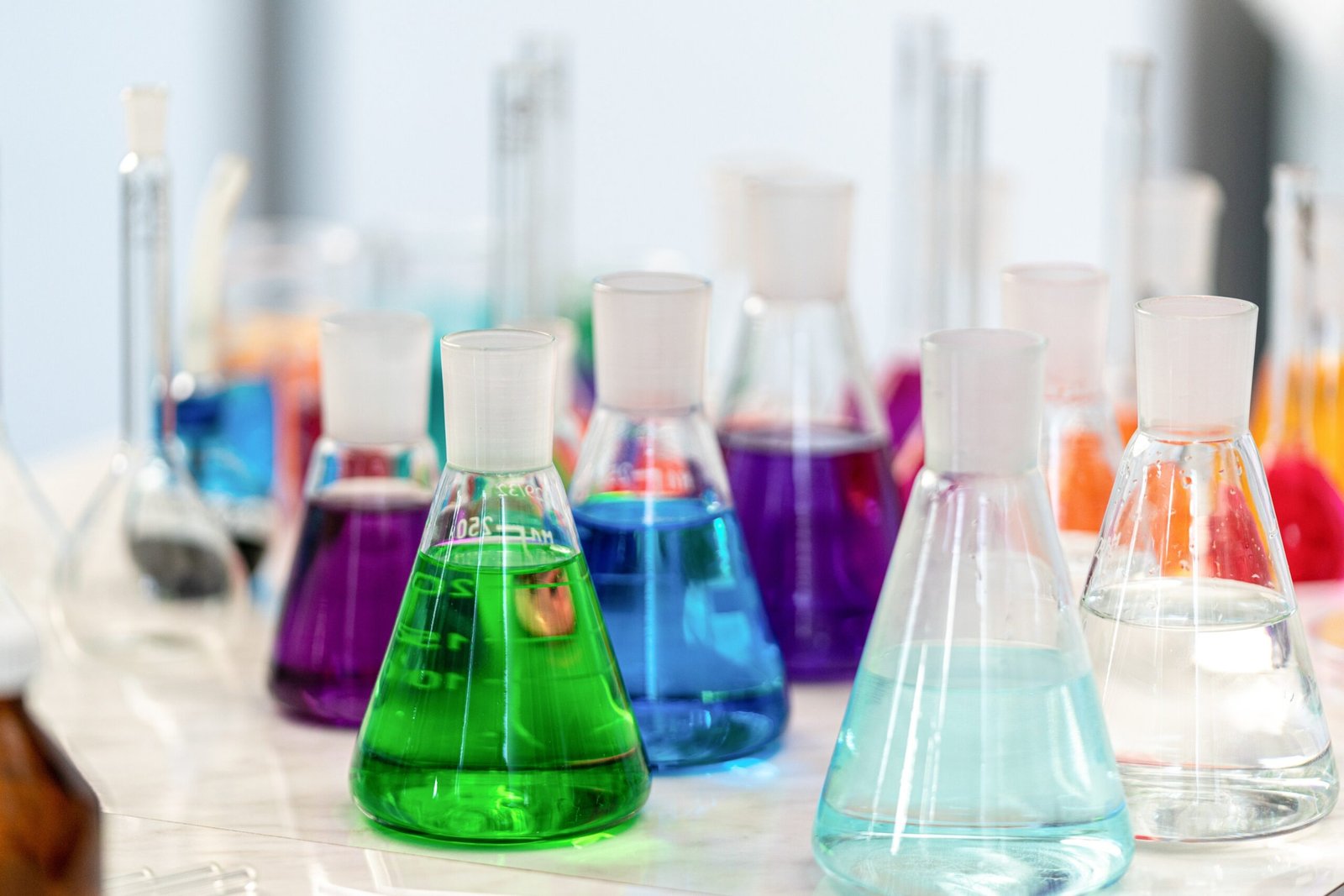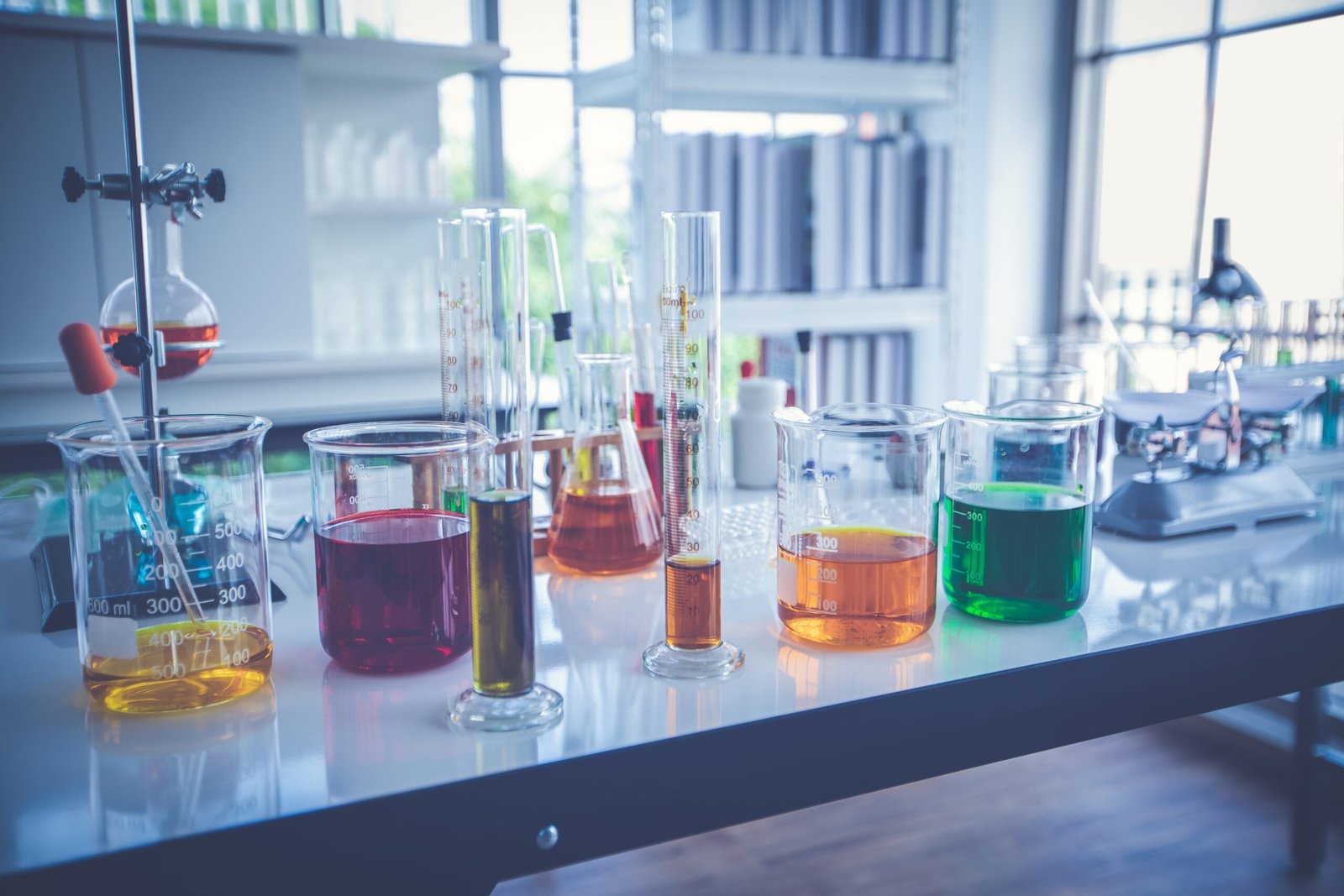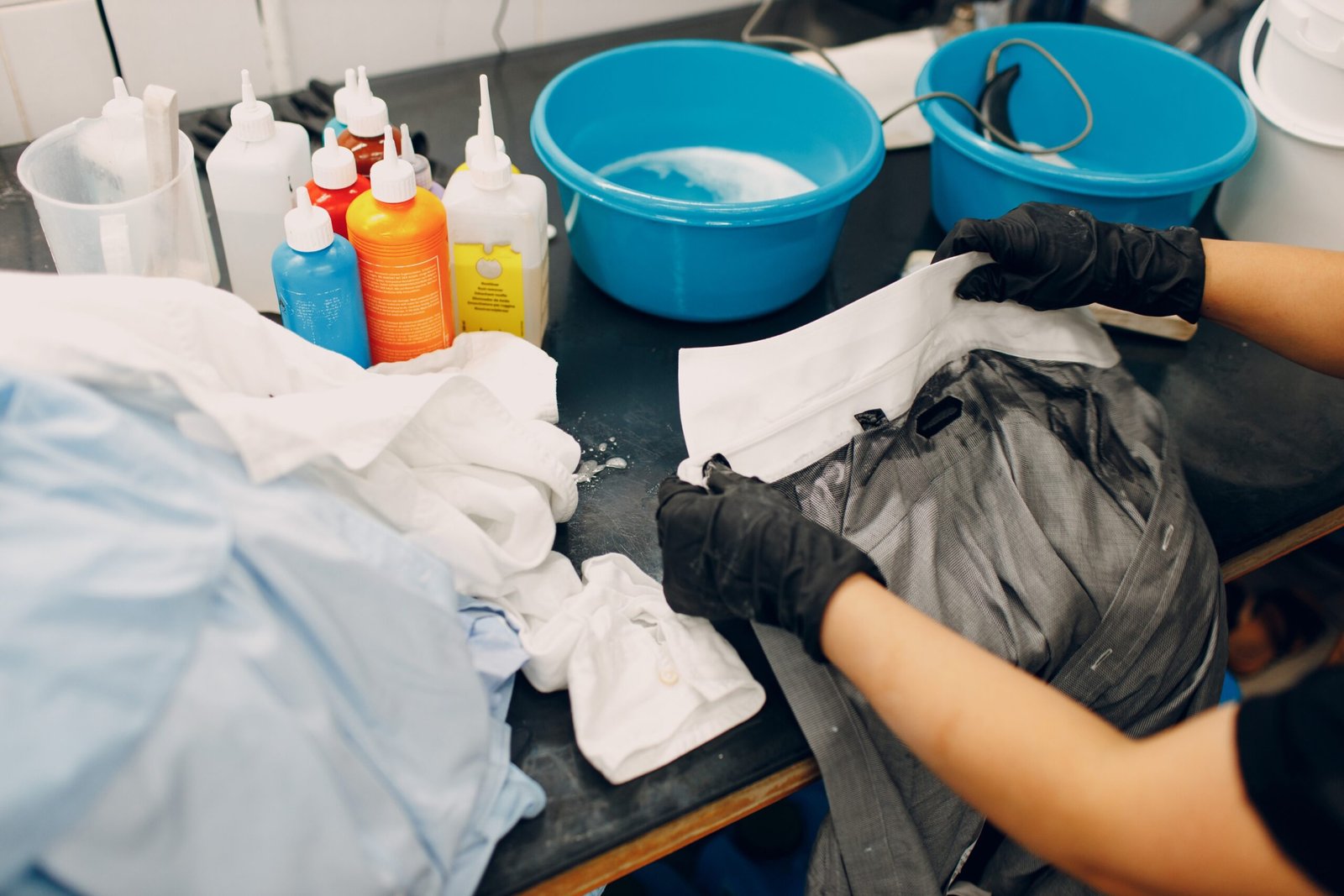In the textiles industry, chemicals are used majorly during the dyes or printing of the finishing stage, and it is the most important process, in both woven and knit fabrics, irrespective the fabric is natural or synthetic, all fabrics go through chemical processes. Safety is of utmost importance in chemical processes because it is directly in touch with the skin, thus eco-friendly textile chemicals are in demand.
Which chemicals are used in textiles?

The basic chemicals are:
- Caustic Soda
- Peroxide
- Stabilizer
- Detergents
- Anti Creasing Agent
- Sequestering Agent
- Wetting Agent
- Enzyme
- Antifoaming Agent
- Softener
- Leveling Agent
- O.B.A.
- Fixing Agent
- Acid
- Salt
Textile-making processes and usages of chemicals

Different chemicals are used during the making of textiles, the basic list of processes is as below:
- Scouring and washing of yarn and fibers: The yarn is scoured and washed using detergents or enzymes to be clean and ready for the textile manufacturing process.
- Bleaching: In the bleaching process, two types of chemical processes are used. Peroxide stabilizers and peroxide killers are used during the bleaching process to either bleach the fabric or neutralize the amount of peroxide in the fabric.
- Mercerising: Concentrated caustic soda is applied to the yarn when it’s under tension, especially for cotton fabric, so later, the fabric becomes more friendly to dyes and chemical treatment going forward.
- Dyeing: There are various dyes used to color the fabric/material, such as indigo dyes, vat dyes, sulfur-based dyes, direct dyes, natural dyes, etc. After dyeing, further processes are required in order to improve the color brightness of the fabric, disperse the dyes, and improve dye penetration in the fabric, these processes are leveling agents, soaping agents, and vat leveling agents.
- Printing: Various chemicals such as pearl binders, puff binders, and other binders are used in printing to make it accurate and clearly visible on the clothes.
- Finishing: Chemicals are used during the finishing process for various purposes such as anti-shrinking, fire-retardant, softness, anti-yellowing over time, and many more.
- Washing: Certain chemicals are used during the washing process either wet wash or dry wash, it removes dirt, dust, waste, and any harmful materials from the textile.
The definition of various processes and involvement of chemicals:

Wetting Agent:
Substances that make solid materials more susceptible to water immersion. Usually some surfactants, such as soap, sulfonated oil, open powder BX, mercaptan, soy lecithin, mercaptan acetal acyl hydrazine, etc.
Textile sizing chemicals:
Different types of water-soluble polymers called textile sizing agents/chemicals such as modified starch, polyvinyl alcohol (PVA), carboxymethyl cellulose (CMC), and acrylates are used to protect the yarn.
Wax removing agent:
wax removal or wax cleaning agent is one kind of colorless non-ionic liquid, especially used in the pretreatment of textile processing, and can effectively remove the oil and wax stains on the fabric, perfectly applied for pure cotton fabrics.
Soaping agent:
Surfactant is the core part of the formulation of the soaping agent. It has the function of dispersion, emulsification, and solubilization. Anionic surfactants commonly used are sulfate, sulfonate, phosphate, and carboxylate. Non-ionic surfactant has polyoxyethylene fatty acid, polyethylene glycol group, polyoxyethylene sorbitan fatty acid esters, and polyol ester on its surface.
Silicone softeners:
Softener is a compound of organic polysiloxane and polymer, which is suitable for soft finishing of natural fibers such as cotton, wool, silk, hemp, and human hair.
Silicone textile finishing auxiliaries have a wide application in textile finishing, including natural fabrics as well as polyester, nylon, and other synthetic fibers. After applying this finishing, the fabric becomes anti-wrinkle, anti-static, anti-fouling, anti-pilling, and soft.
Silicone softener thickener:
The silicone softener thickener can improve the viscosity of the matter, and keep the system in a steady state of suspension or a state of opacification, or forming a gel. It is also widely used in food, coating, adhesive, cosmetics, detergent, printing and dyeing, rubber, medicine, and other fields.
Sequestering agent:
A sequestering agent refers to a complex forming auxiliary chemical with metals such as Iron, Copper, Nickel, Zinc, and Magnesium that are present in water and affect textile processing in many ways.
Scouring agent:
To remove oil stains and impurities from the textile fibers, a large number of auxiliaries with functions of emulsifying, penetrating, washing, dispersing and wetting happen as scouring agents.
The common scouring agents include sizing agents, lubricating agents, oil stains agents, alkali-resistant agents, mercerizing agents, wax-removing agents, penetrating agents, and so on.
Soft finishing agent:
Polyethylene Wax emulsion is a soft finishing agent with a special function in textile processing, it can create high-quality products.
Mercerizing agent:
Mercerizing agent is used to deal with wool and cashmere, it can stop textile from being yellowish and is good at removing scale of wool. It is harmless to the human body.
Which certificates are available for chemicals in the textile industry?

Apart from the chemicals listed above, there are other chemicals also being used in various processes during textile making or dyeing/printing. The questions come as to how to ensure that the final cloth is free from dangerous chemicals. The limit of chemical usage in textiles vary country to country, also, many countries do have specific guidelines about chemical usage, impact on the environment, environment-friendly chemicals or green chemicals, etc. Textile certification programs are useful to check the adherence to chemical limit levels, and to examination of the supply chain to ensure that it is as ethically responsible as possible. Sustainability in the textile chemicals industry is very important. Top textile mills or the largest textile manufacturing companies worldwide use standard chemicals in their processes.
Oeko Tex® is a global standard for textiles and has been in existence since 1992. Their certification is textile-specific and is based on four product classes with increasing limit levels based on the intensity of skin contact and skin sensitivity.
The Asthma & allergy friendly® certification program was established in 2006. The asthma & allergy friendly® certification program maintains a focus on consumer products that will improve the indoor environment for those suffering from asthma and allergies.
The Nordic Swan Ecolabel was established in 1989 and is a voluntary ecolabelling scheme for the Nordic countries (Denmark, Sweden, Norway, Iceland, and Finland). The testing required by this certification mark covers similar areas to the Oeko-Tex® standard, however, it also includes environmental impacts such as the impact of textile processes on local waterways, energy consumption, and packaging considerations.
The Global Organic Textile Standard promotes ecology and social responsibility as well as the chemical analysis of textiles. It requires that at least 90% of the fibers used in products are certified organic. It also addresses water usage and to a certain extent, worker rights within the manufacturing facilities.
Which are the top companies in the textile chemicals industry?

There are many top textile chemicals suppliers globally, here is a list of a few of them – Huntsman Corporation, Archroma International, Dystar Group, Sumitomo Chemical, Allied Industrial Corp. Ltd, LANXESS, DowDuPont Inc., Bozzetto Group, Wacker Chemie AG, Evonik Industries AG, Tata Chemicals Ltd. And so on.
